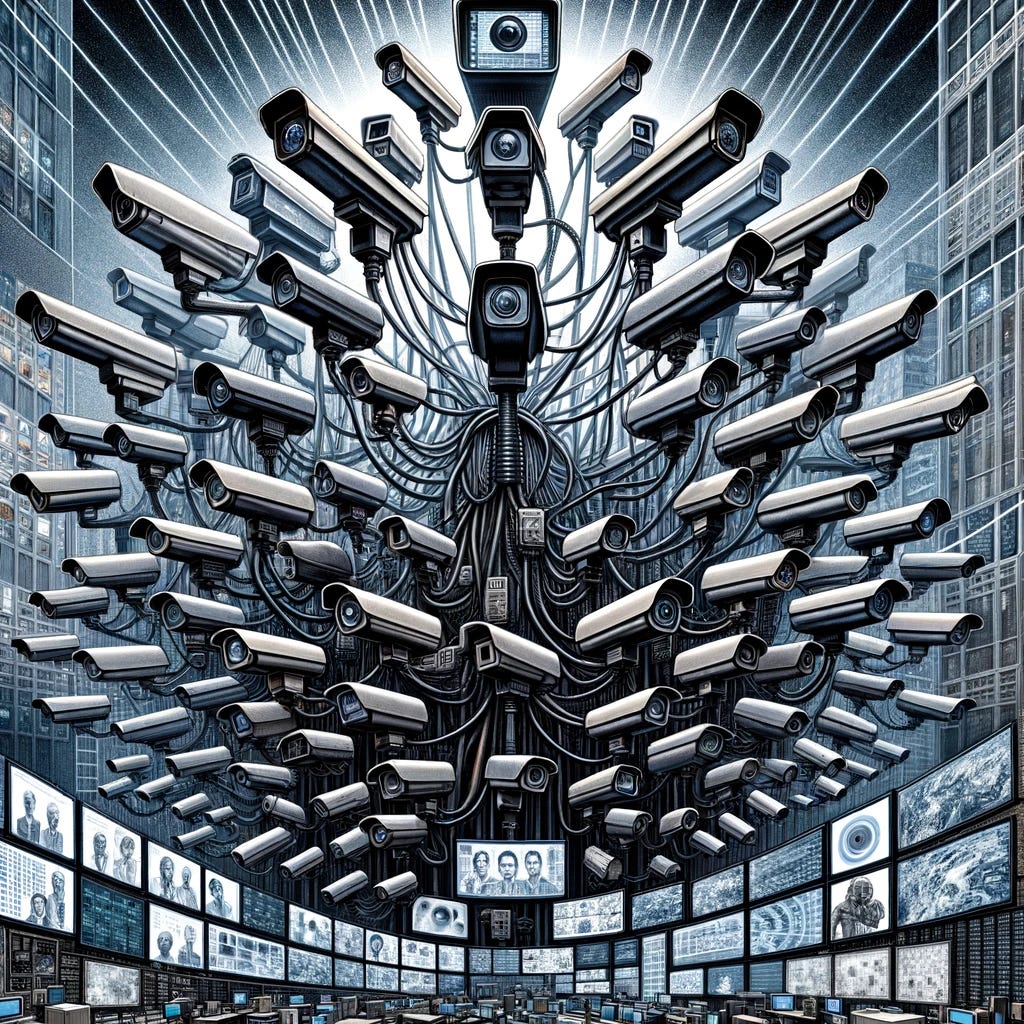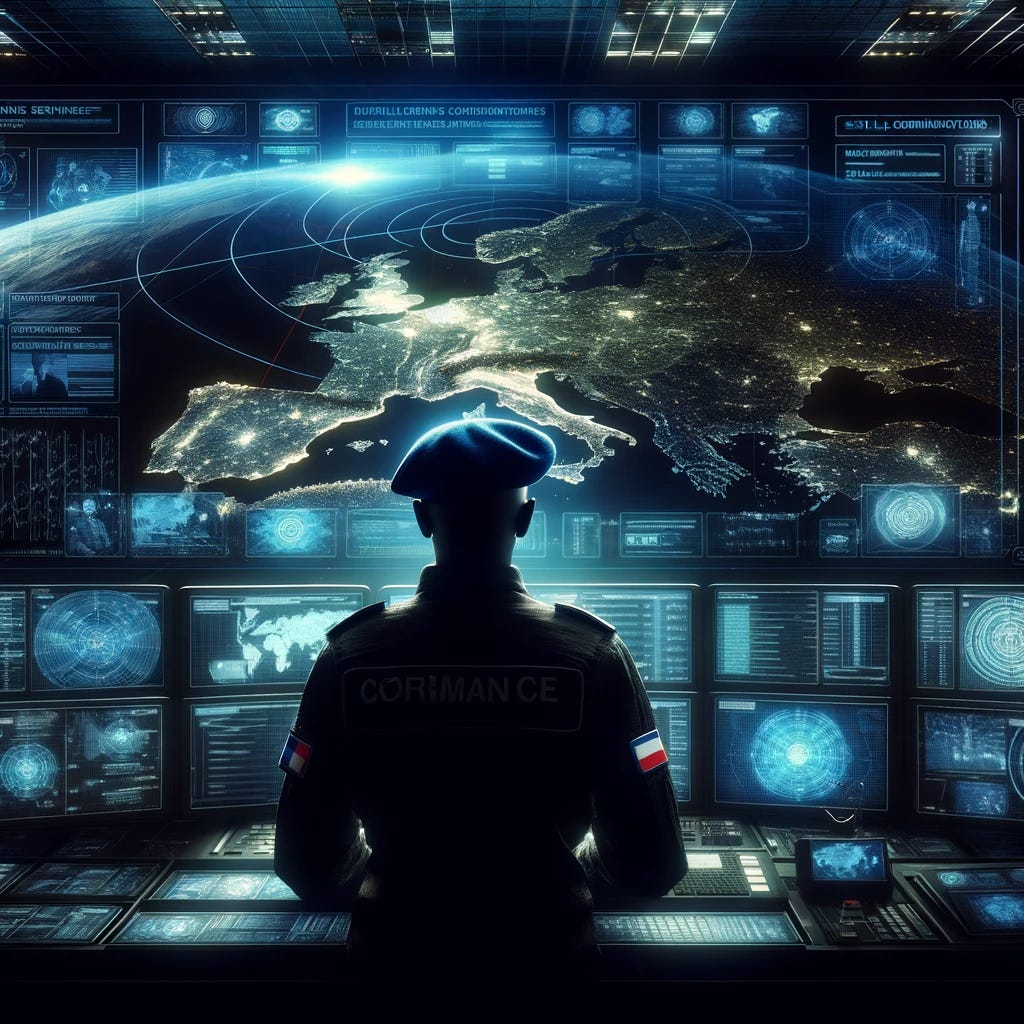Mass surveillance programs in other democratic countries
The interesting and sad example of France
Note : After the 14-part series in which we looked at how nation-states are being disrupted by the Internet and globalization, and a 4-part series on why now is the worst time for them, I have concluded that there are two main ways for governments to respond to these disruptions:
Increasingly control what their residents do, via permanent digital surveillance and the use of AI and machine learning (China's way)
Accept that their role will diminish and treat their residents more like customers
In this new series, corresponding to chapter 4 of my forthcoming book, we analyze the (very) slippery slope towards generalized surveillance to which many countries, including the most democratic, are committing themselves.
Here are the 11 articles of the series :
Many other democratic countries than the US have set up programs for mass surveillance of their populations, often justifying them by the fight against terrorism.
We will see in a future article, that this justification is a convenient excuse that is not justified by the facts.
And even if it would, it's always the same: it starts with a reason that's hard to argue against, then they add another less serious crime, like drug trafficking, then another even less serious one, like money laundering, and within a few decades we find ourselves being monitored in our every move just in case we commit the serious crime of not parking our car in the right place.
France's sad example
And some countries don't even bother with such progressiveness, like... France, which doesn't hesitate to pass laws blatantly incompatible with the Constitution, which can go undetected for a very long time.
In 1991, for example, a law1 was passed, allowing for the surveillance of "transmissions over the air", i.e. all radio communications, without any limits: "without defining the conditions for collecting, using, storing and destroying the information gathered, and without providing any means of monitoring these measures".
This was all the more serious as, over time, "over-the-air transmissions" covered more and more of the networks used by virtually the entire French population on a daily basis, such as :
Wifi connections
Phone calls from cell phones
And even the data transmitted between a wireless landline phone and its base station!
Satellite Internet connections
Computers and tablets connected to 3G, 4G or 5G
Bluetooth connections
Etc. The list is long.
Fortunately, an association for the defense of freedoms and privacy, La Quadrature du Net, filed a Priority Question of Constitutionality with the Constitutional Council, which ruled in 2016 that the entire over-the-air surveillance provisions were unconstitutional2 ... twenty-five years after the law was passed!
So, for 25 years, the French secret services have been able, legally and with complete impunity, to carry out massive surveillance of the French population, or of anyone they deemed interesting, without the need for a warrant and without any particular restrictions, on the basis of a manifestly unconstitutional law.
It's a good thing La Quadrature du Net took legal action: without it, how much longer would this law have remained in force? 10 years? 20? 30?
And that's not the worst of it: French intelligence services are also notorious for setting up illegal surveillance systems.
Thus, the “Loi relative au renseignement” was passed in July 2015, in particular to legalize practices already used completely illegally by the intelligence services, which were more than worth the practices of the NSA: probes were installed at French ISPs, allowing real-time analysis (officially prohibited but technically possible) of browsing metadata3 .

This law provides for the collection of Internet connection metadata via black boxes installed at ISPs, eavesdropping, interception of electronic communications via IMSI catchers (devices that simulate a cell phone communication tower, thus luring all nearby telephones and forcing them to connect to them, enabling communications to be intercepted), surveillance of international communications, via the interception of communications transiting transoceanic cables, in the following cases:
National independence, territorial integrity and national defense;
The major interests of foreign policy, the fulfillment of France's European and international commitments and the prevention of all forms of foreign interference;
France's major economic, industrial and scientific interests ;
Prevention of terrorism ;
The prevention of :
Attacks on the republican form of institutions ;
Actions to maintain or reconstitute groups dissolved under article L. 212-1 ;
Collective violence likely to seriously disturb the public peace;
Prevention of organized crime and delinquency;
Preventing the proliferation of weapons of mass destruction.
We can immediately see that some terms are very vague: "the major interests of foreign policy", "the major economic, industrial and scientific interests of France", "the prevention of attacks on the republican form of institutions", "the prevention of collective violence likely to seriously undermine public peace" - really?
Do we agree that this can be interpreted in any way?
Here are a few examples:
"France's major economic, industrial and scientific interests" officially authorizes economic espionage, including on subjects of French nationality.
Demonstrations considered unfavorable to the government in power could be considered as "collective violence likely to seriously undermine public peace", which would authorize the surveillance of the organizers of these demonstrations, and even their participants.
A political party, an association, journalists or authors in favor of restoring the monarchy could be considered as "undermining the republican form of institutions", and put under surveillance.
Myself, given that my book and this blog describe the various mechanisms by which nation-states - including Western democracies - are being disrupted, and how to make a go of it in this new world, could be seen as someone questioning :
National independence, territorial integrity and national defense;
The major interests of foreign policy, the fulfillment of France's European and international commitments and the prevention of all forms of foreign interference;
France's major economic, industrial and scientific interests ;
The republican form of institutions ;
Am I going to be put under surveillance? The mere fact that the law allows it, and that the only obstacle to such use would be a nine-member commission's interpretation of the law, is extremely worrying.
“Can’t be evil” is better than “Don’t be evil”
What we want is a law that prohibits such practices, not a law that "could be dangerous for privacy and the balance of power between government and citizens, but don't worry, our wonderful nine-member commission protects you against this potential drift, trust us", because, guess what, you're never safe from a bad government coming to power and just grabbing institutions and practices whose protections against excesses of power were based on trust.
The most tragic example was when the Nazi party came to power in 1930: they could easily oppress the Jews, and start organizing the Holocaust, by seizing all the administrative documents of the German republic that catalogued Jews as such4 , information on religion that had been requested "just in case", with the assurance "don't worry, only the state will have access to it".
But even such guarantees are not enough: journalistic investigations have shown that, in addition to certain blatantly illegal operations, the French secret services exploit the slightest legal loophole to spy on the French population5 .
So you have to protect against these practices yourself, using encryption, VPNs and other tools: in fact, you have to stop being illiterate in IT security, because it's becoming a vital skill if you want to be a citizen who respects his or her rights, and be on the right side of history in the coming upheavals.
We'll talk about this in more detail later in the book and in future articles.
Coming soon...
The conclusion of this series, on how to create an effective counterweight to governments that engage in mass surveillance.
In the meantime, feel free to follow Disruptive Horizons on Twitter, and join the tribe of Intelligent Rebels by subscribing to the newsletter :
Other articles in the series
Loi n° 91-646 du 10 juillet 1991 relative au secret des correspondances émises par la voie des communications électroniques.
"Decision no. 2016-590 QPC of October 21, 2016", Constitutional Council.
"La surveillance du Net a été généralisée dès 2009", Jérôme Hourdeaux, 2016
"How did the Germans know who was Jewish?", World Jewish Congress
"Surveillance : petite histoire de la légalisation du Deep Packet Inspection", Félix Tréguer, Médiapart, 2017






Here in the US from the earliest pioneering days of radio technology we've had a widely accepted understanding that its legal for anyone to receive any radio broadcasted signals. This is the prime/bottom layer, then we start adding layers of complexity on top of this (encryption, licensure, public safety, etc). So if you're generating radio broadcasts (via the seemingly dormant cell phone in your pocket), you have no right to assert "privacy" to these transmissions. If you want a state of things that most closely resembles "privacy", you have this option: you can either shut down your radio shack entirely (shut off your cell phone), or leave the radio shack on and simply kill the power line going to your transmission antenna (put your cellphone into "airplane mode"). If "privacy" is so important to you - then just stop broadcasting radio signals... don't argue to change our ~100 year laws guaranteeing the public the right to freely receive all radio broadcast transmissions.